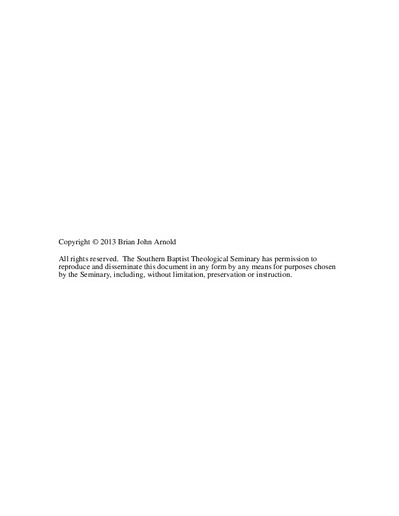Justification One Hundred Years After Paul
Subject
Paul, the Apostle, SaintJustification (Christian theology)--History of doctrines--Early church, ca. 30-600
Abstract
This dissertation seeks to answer the following question: how did the doctrine of justification fare one hundred years after Paul's death (c. AD 165)? The thesis argued is that Paul's view of justification by faith is present in the second century, which particularly challenges T. F. Torrance's long-held notion that the Apostolic Fathers abandoned this doctrine.
Chapter 1 provides an overview for the study. Groundwork is laid by providing a history of research on the reception of Paul in the second century as well as a section examining the important works on justification in the Fathers.
Chapter 2 examines justification in 1 Clement. Looking primarily at chapter 32, it is argued that Clement held to justification by faith alone apart from works, despite the frequent claim that he held to works righteousness.
Chapter 3 analyzes the seven letters of Ignatius. Although he only makes one pertinent reference to justification, Ignatius does have much to say against Judaism, which reveals a good deal about his view of justification.
Chapter 4 covers the oft-tread ground of justification in the Epistle to Diognetus. The ninth chapter of Diognetus contains the clearest expression of justification in the second century.
Chapter 5 surveys the Odes of Solomon. This overlooked songbook has a wealth of soteriological motifs, including mentions of justification. In at least three Odes there appears to be a dependence on Paul for the Odist's view of justification, and at times, imputation.
Chapter 6 explores justification in Justin Martyr's Dialogue with Trypho. Trypho informs Justin that he must keep the whole law in order to be saved. Justin, in turn, looks to the Old Testament, particularly to Abraham, as proof that justification comes by faith and not by adherence to the law.
The five authors examined demonstrate greater theological continuity between the first and second centuries than has often been recognized. Paul's doctrine of justification by faith was not replaced with works righteousness in the following century. Justification fared well one hundred years after the Apostle's death.

